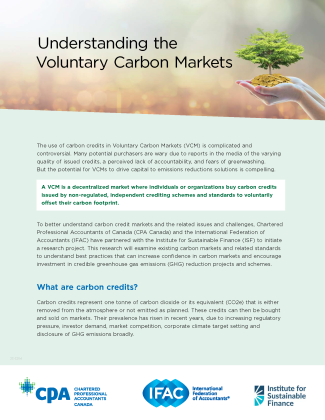
Preview: Understanding the Voluntary Carbon Markets
In November 2023, IFAC, along with Chartered Professional Accountants Canada and the Institute for Sustainable Finance, published a preview to a research project on Understanding the Voluntary Carbon Markets. This introduces a forthcoming series of reports on the Voluntary Carbon Markets (VCMs) aimed at clarifying the role of VCMs and the use of carbon credits and to the role of professional accountants.
Carbon offsetting is a strategy for reducing the overall carbon emissions of an organization or individual, often via carbon credits. A single carbon credit is represented by one ton of carbon dioxide or its equivalent that is not emitted as planned or that is removed from the atmosphere. An organization that reduces or removes emissions may sell the carbon credits they accumulate to buyers who are attempting to become net-zero or carbon neutral but are unable to eliminate excess emissions due to cost or technology limitations. These credits are often sold in VCMs, decentralized markets where individuals or organizations buy credits to voluntarily offset their carbon footprint. These carbon credits are “voluntary” in the sense that the use of carbon credits for reducing emissions is not legally required or regulated. The top 4 voluntary registries serving the markets for carbon credits are:
- Verra’s Verified Carbon Standard (VCS)
- Gold Standard (GS)
- Climate Action Reserve
- American Carbon Registry
As discussed in Understanding the Voluntary Carbon Markets, the supply of carbon credits has grown dramatically in the past two decades. However, VCMs are complicated and controversial. Professional accountants will have a role in enhancing the integrity of VCMs and identify key opportunities to foster trust, bolster transparency and strengthen accountability.
With their dramatic growth and their potential for more sustainable economies, VCMs present interesting considerations for companies and professional accountants around the world. Future installments of this series will focus on the fundamentals of VCMs, the process of generating and using carbon credits, how market participants are incentivized, the role of accountants in enhancing the integrity , and more.
Learn more about practices and standards to ensure confidence in carbon markets plus key opportunities for professional accountants to foster trust, bolster transparency and strengthen accountability in the voluntary carbon market in Understanding the Voluntary Carbon Markets.

